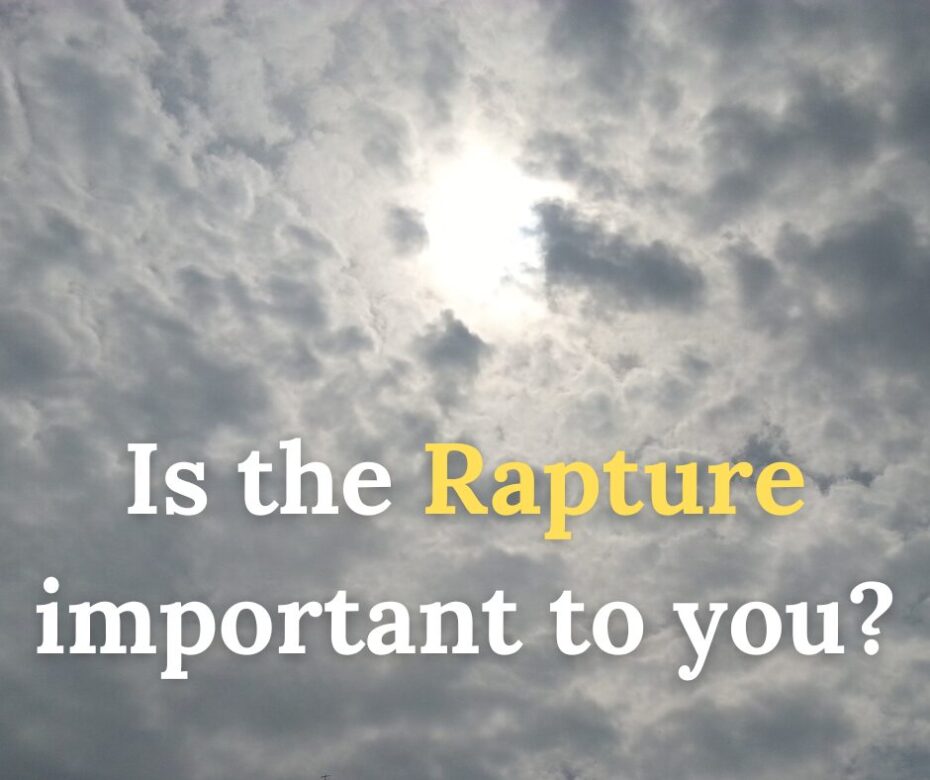The Left Behind books by Tim LaHaye and the movies based on those books brought a lot of attention to rapture theology. While many know about the Rapture, most professing Christians do not believe in it. Two major objections to the rapture position are 1) the word rapture is not found at all in the Bible, and 2) the teaching is relatively new.
Let’s consider both objections.
The first objection is meaningless. Many key theological expressions are not found in the Bible: eternal security, the Trinity, the hypostatic union, accountability, responsibility, sovereignty (used once in the NKJV of King Saul in 1 Sam 14:47), omnipotence (omnipotent is found once in Rev 19:6), omnipresence, omniscience, sanctification, and discipleship.
If an idea accurately reflects the teaching of Scripture, it does not matter that the expression is not found in the Bible. The concept is.
The second objection is also worthless. Many good and bad theological views are newer teachings than the Rapture (Anne Hutchinson taught it in the Massachusetts Bay Colony in the 1630s, and John Nelson Darby popularized it in the 1830s). Some of these views include believer’s baptism (infant baptism was the norm until the sixteenth century), the Lord’s Supper, Dispensationalism, textual criticism (Critical Text and Majority Text), the New Perspective on Paul, Open Theism, egalitarianism, neoorthodoxy, and postmodernity.
If a theological expression accurately expresses what the Bible teaches, then when that expression arose is unimportant.
The teaching of the Rapture is found widely in both the OT and NT.
The following are types of the Rapture in the OT: Enoch and Elijah being taken alive into heaven in whirlwinds; Noah and his family being saved from the Flood by means of the ark; and Lot and his wife and daughters escaping Sodom.
There are also types of the Rapture in the NT: Paul’s being caught up into the third heaven (2 Cor 12:2); John’s being caught up into the third heaven (Rev 4:1-2); and the Lord Jesus ascending into the sky and out of sight as the disciples watched (Acts 1:9-10).
There is also direct teaching on the Rapture in the NT.
Paul’s words in 1 Thess 4:13-18 are powerful and clear. The dead in Christ will rise first, then we who are alive will be caught up to meet the Lord and the departed believers in the sky (v 17).
He also taught about the Rapture in 1 Thess 5:1-11. Church-age believers will miss the Tribulation (wrath) by means of deliverance via the Rapture (1 Thess 5:9).
The Lord Jesus taught the Rapture in Matt 24:40-42. See the three excellent articles by Dr. John Hart providing ten terrific proofs (Part 1, Part 2, Part 3).
The fact that the Church is not mentioned in Revelation 6-19 supports rapture teaching as well. So does John 14:1-3.
So why is it important to believe in the Rapture?
First, it gives us joy to know that our Lord will not allow us to go through that terrible time of the Tribulation. Sudden destruction will come upon the unbelieving world (1 Thess 5:3), but we will be saved from that (1 Thess 5:9).
Second, the Rapture reminds us that the Lord Jesus could return at any moment. It causes us to be watchful for His soon return. It keeps us longing to have His approval and to hear Him say, “Well done, good servant.”
The most important aspect of the Rapture is its imminence. It has been imminent since Jesus’ ascension. James 5:9 shows that it was imminent during the first half of the first century. John said, “It is the last hour” (1 John 2:18).
Look at Matt 24:48. The faithful servant became unfaithful after he thought, “My master is delaying his coming.” The same is true in 2 Pet 3:4, “Where is the promise of His coming? For since the fathers fell asleep, all things continue as they were from the beginning of creation.” Sadly, many reject the idea of the Rapture and the imminent return of Christ. In doing so, they are rejecting an important motivation in the Christian life. I think they substitute the idea that they could die at any moment, even though most people don’t really think that way. But if we grasp rapture truth, we are motivated by the fact that Jesus could return for us at any moment.
I came to faith in Christ at age twenty. I learned about the Rapture at that time. I remember guys saying, “It’s all going to burn.” I remember our looking forward to the Rapture. We were not looking forward to dying. We were hoping we’d never die. One of our sayings when we left someone and might not see them again was, “Here, there, or in the air.”
Is the Rapture important to you? If so, why?
Keeping the Rapture in focus helps you keep grace in focus.


